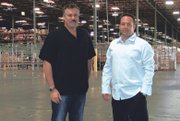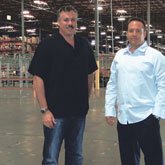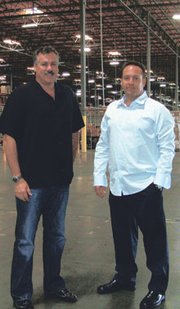Outsourcing Infrastructure Like the Big Guys
Polygon Solutions seeks to help start-up apparel makers with a combination of industry experience, ERP technology and modern distribution.
Nestled between the Los Angeles and Long Beach ports is a 412,000-square-foot warehouse where apparel by massive brands such as Kenneth Cole and Perry Ellis enter the United States to be inspected, bagged and shipped out to major retailers around the country.
Fully automated and staffed by up to 300 employees, Advanced Quality Logistics has the kind of large-scale infrastructure that small, start-up companies can only dream of. Ted Houston hopes to change that.
Houston is the president of Polygon Solutions, a new San Pedro, Calif., company that seeks to give small, start-up companies access to the large-scale infrastructure used by major manufacturers and retailers. Founded in January, Polygon operates out of a few offices within the headquarters of 4-year-old AQL.
In its 4frac12;-month existence, Polygon has landed five clients—two international companies, including Salsa Jeans out of Portugal and Olga de Polga, based in London, and three Los Angeles brands, including sneaker maker Graffeeti, men’s and women’s lifestyle collection Artisan Deluxe, and luxury sheepskin-boots collection Malibu Cowboy. Houston has two more potential clients he hopes to sign in the next few weeks.
“Typically, our client is either a start-up or an emerging brand led by a creative entrepreneur,” he said. “Many are based in their garages. Maybe they’re using QuickBooks or maybe Excel, and they need to get to the next level.”
Companies that sign up with Polygon get access to AQL’s distribution and warehousing operations and Full Circle software, the ERP (enterprise resource planning) system created by Innovative Systems.
On Houston’s desk in his office is a copy of Urban Outfitters’ EDI (electronic data interchange) and shipping requirements. He pointed out a few highlights, including instructions on the proper way to fold the garments before placing them into the box and a diagram showing which way the corrugated lines should run on the inside of the cardboard box.
“Can you imagine a designer—an entrepreneur—reading this and digesting it?” Houston said. “The buyer will say, ’Great, I’ll give you an EDI variance for the first order.’ You’ve got to get EDI now. Unfortunately, it presents a two-edged sword [for manufacturers]. They know they need that business to grow, but they don’t know how.”
As an example, Houston points to Polygon client Olga de Polga, which landed a test order from Lord & Taylor at the Bread & Butter trade show in Berlin. The order came with specific requirements about poly-bagging, hangtags and pick tickets. “The order went out perfect,” he said.
Among the services Polygon offers are EDI and sales-order management, style and UPC catalog management; production tracking, inventory and returns management; and customer service.
AQL also offers a wide range of services, including quality control and inspection, repairs, pressing and steaming, pick and pack, ticketing, warehousing, and electronic invoicing. Its docking facilities are located in the Port of Los Angeles, and trailers can be loaded and routed directly to stores or to distribution sites.
Leveraging experience
In addition to AQL’s operations and Full Circle software, Polygon’s clients also get access to Houston’s expertise. The longtime apparel-industry veteran has a reacute;sumeacute; that reads like a who’s who of Los Angeles contemporary brands.
Houston was chief executive officer at EMU Australia and president of People’s Liberation and William Rast. He was chief operating officer of Rock & Republic and executive vice president and chief operating officer of C&C California—helping the luxury T-shirt label grow to become a $26 million brand that caught the attention of manufacturing giant Liz Claiborne, which purchased the brand in 2005. (The company is now owned by Perry Ellis, which purchased it from Liz Claiborne in 2008.) Houston has also served as COO of Dickies Girl and supply-chain director of Bebe and got his start in the industry as a consultant for CPA firm Moss Adams.
“For small companies looking to grow, they get a virtual CEO,” Houston said.
“I’ve been lucky to have been with some great brands. I can leverage my relationships. I can recommend suppliers and freight forwarders. Need a factory in Canada or in China? A sweater maker or denim maker or hoodies or wovens? I’ve got them all.”
Thanks to Houston’s partnership with AQL, Polygon customers can take advantage of AQL’s buying power as well.
“You get to buy boxes as if you were Kenneth Cole,” Houston said. “Your $1 million T-shirt company will receive the same level of customer service as Perry Ellis.”
Using Polygon’s system, a company could outsource all but the design, production and sales functions, Houston explained.
“We handle your customer-service functions for you, we issue [return authorizations], interface with CIT,” he said. “At such time you’re ready to produce the goods, we issue a [purchase order] for you. We track it. We liaise with the factor, the customs broker of your choice. The goods are received at AQL, we issue a pick ticket and it automatically goes out to AQL’s system. They pick the goods, pack them and ship them. We invoice the customer and you collect your money.”
Polygon charges no upfront costs. Instead, the company takes a percentage of the order when the goods ship. The percentage charged depends on the size of the order. For example, a large footwear maker recently contacted Polygon requesting help with its department-store business.
Polygon was willing to take a reduced rate because “one order to Macy’s is easier to ship than 600 mom & pops,” Houston explained.
The service also eliminates what Houston calls “the distraction costs,” meaning the time spent on operations functions rather than strictly focusing on design and sales.
“There’s a long-term detrimental cost to business when Mr. and Mrs. Creative Entrepreneur stop focusing on product to handle customer-service issues or to hire someone to do that,” he said. “That cost is a soft cost.”
Focus on small
Polygon has four employees. In addition to Houston, the company employs two people do data entry and customer service and one person for sales.
“No one has ever put these kinds of businesses together before,” said AQL’s David V. Latona, co-founder of Polygon along with AQL’s Owen Schmidt. Both are managing directors of AQL.
Houston’s and Latona’s paths crossed early in their careers. Before opening AQL, Latona was a partner for 22 years in Vector Design Inc., which designed and implemented material-handling systems for retailers.
“I met Dave when he was installing a material-handling system for BCBG, which was also a client of mine at Moss Adams,” Houston said. “I was managing a system implementation, and our paths crossed because the system I was implementing managed goods that flowed through the material-handling equipment he designed.”
Schmidt has more than 20 years of experience in various supply-chain executive roles for consumer products.
Houston and Latona acknowledge that Polygon addresses a need in the apparel industry. Between the partners’ collective industry experience and AQL’s infrastructure, Polygon is well-positioned to address the opportunity. But both also stress the altruistic nature of the effort.
“The problem is most gifted designers don’t know about the distribution side of the business,” Latona said. “Between heading up with factory people, sales people, our affiliations with customs brokers and factors, we can help these people take an idea and put it on the shelf.”
In addition, Houston describes Polygon’s business model as a “viable feeder system for our business.” The system can help small companies get beyond the start-up phase by positioning them to be able to accept, fill and deliver larger orders to major retailers—without taking on the infrastructure costs of a large company.
“Expenses grow at a faster rate of ascent than sales—always,” Houston said. “What I enjoy doing is figuring out how to build the infrastructure to keep [these companies] profitable.”
For more information, visit www.polygonsolutionsnow.com.
























